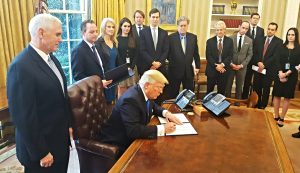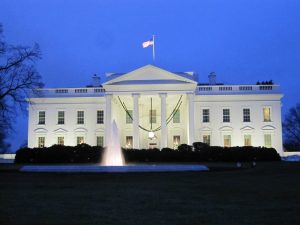On March 7, the U.S. District Court for the District of Columbia issued a ruling denying a motion for a preliminary  injunction filed by the Cheyenne River Sioux Tribe challenging an easement granted on February 8 by the U.S. Army Corps of Engineers to Dakota Access, LLC, the owners and operators of the Dakota Access Pipeline. It argued that the presence of oil in a pipeline constructed beneath Lake Oahe, a “federally regulated waterway that forms part of the Missouri River and straddles North and South Dakota,” will cause irreparable harm to its members’ religious beliefs in violation of the Religious Freedom Exercise Act (RFRA). According to the District Court, at the start of 2017, the Lake Oahe crossing is the only portion of the pipeline that is not finished. The case is Standing Rock Sioux Tribe and Cheyenne River Sioux Tribe v. U.S. Army Corps of Engineers.
injunction filed by the Cheyenne River Sioux Tribe challenging an easement granted on February 8 by the U.S. Army Corps of Engineers to Dakota Access, LLC, the owners and operators of the Dakota Access Pipeline. It argued that the presence of oil in a pipeline constructed beneath Lake Oahe, a “federally regulated waterway that forms part of the Missouri River and straddles North and South Dakota,” will cause irreparable harm to its members’ religious beliefs in violation of the Religious Freedom Exercise Act (RFRA). According to the District Court, at the start of 2017, the Lake Oahe crossing is the only portion of the pipeline that is not finished. The case is Standing Rock Sioux Tribe and Cheyenne River Sioux Tribe v. U.S. Army Corps of Engineers.
Articles Posted in Environmental
Fifth Circuit: Some Degree of Propinquity Is Required To Maintain Claims
In Board of Commissioners of the Southeast Louisiana Flood Protection Authority – East, et al., v. Tennessee Gas Pipeline Company, L.L.C., et al., the U.S. Court of Appeals for the Fifth Circuit issued a unanimous ruling affirming the District Court’s decision to: (a) reject the Board of Commissioners of the Southeast Louisiana Flood Protection Authority–East’s (Board) motion to remand this cost recovery and injunctive action to the state courts of Louisiana; and (b) dismiss the complaint alleging claims against 97 oil and gas companies in connection with their oil and gas operations and activities off the Gulf Coast for any years for failure to state a claim.
Federal and State Cooperative Efforts Provide Basis For DC Circuit Upholding Delisting of Gray Wolf
In the case of Defenders of Wildlife. et al., v. Zinke., et al., the U.S. Court of Appeals for the DC Circuit reversed the U.S.  District Court for the District of Columbia, and reinstated the U.S. Department of the Interior’s 2012 decision to delist the Wyoming Gray Wolf, which had been listed as an endangered species under the Endangered Species Act (ESA) in 1973. The District Court vacated the rule, holding that the Fish and Wildlife Service’s determination that that the State of Wyoming had put in place adequate regulatory mechanisms in the conservation management plan of the State of Wyoming (Wyoming Management Plan) to protect the wolf was arbitrary.
District Court for the District of Columbia, and reinstated the U.S. Department of the Interior’s 2012 decision to delist the Wyoming Gray Wolf, which had been listed as an endangered species under the Endangered Species Act (ESA) in 1973. The District Court vacated the rule, holding that the Fish and Wildlife Service’s determination that that the State of Wyoming had put in place adequate regulatory mechanisms in the conservation management plan of the State of Wyoming (Wyoming Management Plan) to protect the wolf was arbitrary.
Changed Circumstances Warrant Modifications To Injunction
In Government of the Province of Manitoba v. Zinke, the U.S. Court of Appeals for the DC Circuit reversed the U.S. District Court for the District of Columbia and held that the State of North Dakota could begin designing a water treatment plant for an area of North Dakota whose public drinking water quality has been substandard for a long time. The project is known as the Northwest Area Water Supply Project. The District Court had rejected the State’s request to modify an injunction that kept the project from moving forward. Reviewing the District Court’s ruling, the DC Circuit has held that the District Court abused its discretion in not accepting North Dakota’s argument that a significant change in circumstances warranted this relief.
What’s In Store For Electric Storage Resources?
In Energy Storage: Finding New Home with FERC Policy Statement and Notice of Proposed Rulemaking, my colleagues Michael Hindus, Kevin Ashe and I discuss the Federal Regulatory Agency Commission’s (FERC) November 2016 notice of proposed rulemaking (NOPR), January 19 policy statement confirming that electric storage resources may be able to recover both cost-based and market-based rates, and market participates’ comments on the FERC’s NOPR. Market participants seeking to bring storage resources to the wholesale electricity marketplace are encouraged to consider the implications of these recent efforts to incorporate electric storage on a wider scale.
Executive Order For Review of WOTUS Rule
Earlier today, we published our client alert Trump Administration Seeks to Limit Coverage of Clean Water Act, Executive order to set out a new definition of “Waters of the United States” discussing a February 28, 2017 executive order directing that the Waters of the United States Rule (commonly referred to as the WOTUS Rule) be reviewed and revised or repealed. Although the executive order starts the process, its completion is expected to take at least a year or two given the formal administrative process required for repeal or replacement. In 2016, the WOTUS rule was stayed by the Sixth Circuit Court of Appeals pending further action. The repeal will be significant for project developers, such as solar projects and real estate developers, as well as for farmers and ranchers, mining companies and other energy companies. More administrative actions are expected given the aggressive approach by the Trump Administration to roll back the Obama Administration’s regulation on this issue.
Additional Source: Presidential Executive Order on Restoring the Rule of Law, Federalism, and Economic Growth by Reviewing the “Waters of the United States” Rule; Construction Industry to See Greater Federal Footprint in Projects with New “Waters of the United States” Rule
Texas Supreme Court Reverses Two Court of Appeals Decisions Involving Environmental Issues
On February 24, the Texas Supreme Court released several decisions, including two rulings involving aspects of environmental law. The cases are ExxonMobil Corporation v. Lazy R Ranch, et al., and ExxonMobil Pipeline Company, et al., v. Coleman.
POTUS Executive Order “Enforcing the Regulatory Reform Agenda”
Referencing Executive Orders issued by past administrations, on February 24, 2017, President Trump issued a new  Executive Order: “Enforcing the Regulatory Reform Agenda.” The Executive Order establishes new procedures and timelines by which most federal administrative agencies must conduct their regulatory planning and review.
Executive Order: “Enforcing the Regulatory Reform Agenda.” The Executive Order establishes new procedures and timelines by which most federal administrative agencies must conduct their regulatory planning and review.
TX High Court Clarifies “Common Carrier” Status Criteria
In The Texas Supreme Court Clarifies “Common Carrier” Status Criteria, Pillsbury attorneys Anthony Raven, Olivia Matsushita and Andrew White discuss the Texas Supreme Court’s recent opinion in Denbury Green Pipeline-Texas, LLC v. Texas Rice Land Partners, Ltd. Among other things, the Court provides judicial clarity on the “reasonable probability” public use test that might positively demonstrate that a pipeline owner is a common carrier for the purposes of Texas law. Affected private landowners will still be able to challenge a CO pipeline owner’s self-designation as a common carrier.
Additional Source: Securing Rights-of-Way to CO2 Pipeline Corridors in the United States; The Future of Carbon Dioxide Injection EOR in the United States
Supreme Judicial Court of Massachusetts Confirms Anti-Slapp Provisions Apply To “Protected Petition Activity”
On February 14, the Supreme Judicial Court of Massachusetts reviewed the application of the state’s “anti-SLAPP” law to challenges made against a blogged critique of Cardno Chemrisk, LLC (Chemrisk) and British Oetroleum (BP) in the case of Cardno Chemrisk, LLC v. Cherri Foytlin & Another, confirming that it protects pamphleteers/bloggers. Continue Reading ›
 Gravel2Gavel Construction & Real Estate Law Blog
Gravel2Gavel Construction & Real Estate Law Blog


